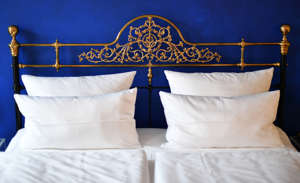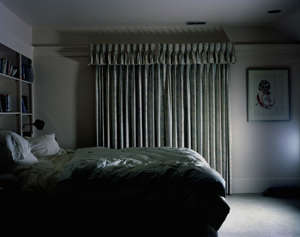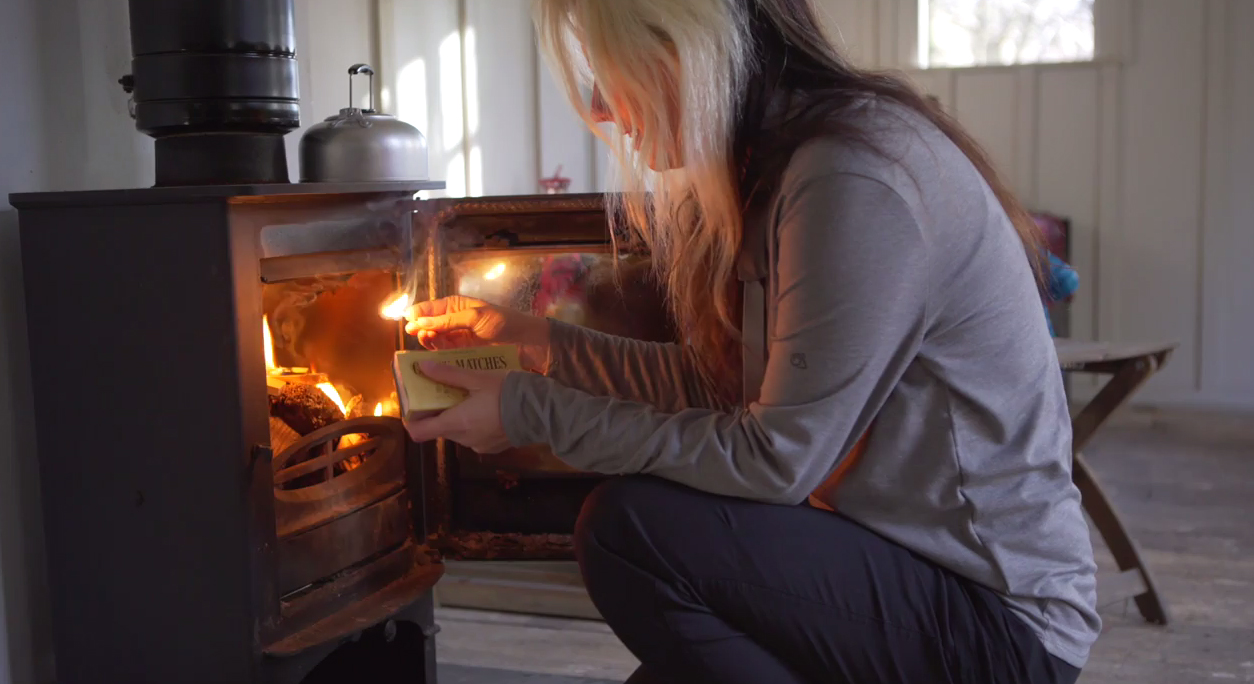
© Jens Kalaene/picture alliance via Getty Images What are the best tips for getting a good sleep - whatever time it might actually be? Dr Shahid Aziz
Consultant cardiologist, North Bristol NHS trust, Bristol
 © ER Productions/Getty Exercise, apps, and breathing techniques can help with sleep says Dr Aziz
© ER Productions/Getty Exercise, apps, and breathing techniques can help with sleep says Dr Aziz
I have always found sleep to be a physiological necessity for my mind and body to recover – a good sleep has a significantly positive impact on my sense of wellbeing the next day. When I started as a junior doctor, I accepted that working nights and being on call was part of the training culture. What I did not envisage was that I'd still be having interrupted sleep 25 years later.
My job as an interventional cardiologist means that I am often called into the hospital from home after midnight to deal with patients having heart attacks. Often I'm on call after a full day of routine work. Busy nights on call can take their toll on our physical and emotional wellbeing, and sleep recovery can take several days. I had a particularly challenging night recently when I was called in three times to deal with heart attacks and cardiac arrests. I felt too fatigued to go in for a routine day the next morning.
One of the challenges we face as doctors is to recognise when we should or shouldn't be working. To make high-quality decisions for patient care, including for procedure-led specialities, you have to maintain a sharp focus. As a consultant, I also have to provide leadership to staff around me and communicate well with patients and their families.
Routine: To help me sleep, I like to exercise. I go to spinning classes, the gym and do road cycling a few times a week. I have the Calm meditation app on my phone, which I use at night for a few minutes. This really helps me as I do stretching exercises. I write in my journal every night – it can be anything from random thoughts to reflections of gratitude. I avoid screens before bedtime and read 10-20 pages every night. Usually I fall asleep quickly but sometimes I use 4-7-8 breathing exercises to help me.
Harpz Kaur
Breakfast show presenter on BBC Asian Network
 © Andrew Benge/Redferns Harpz Kaur
© Andrew Benge/Redferns Harpz Kaur
I'm definitely a bad sleeper and found it very difficult to overcome once I was given the breakfast slot. I decided to join yoga classes to help me unwind and relax. I train at the gym regularly so that I know I will be tired enough by the end of the day to naturally want to sleep.
Routine: Changing the ambience of my home has been important. To make it a more relaxed atmosphere, I have calm/relaxation music playing through my speakers and light candles around the room. These little things make big differences. And I also make sure I am not doing too much throughout the day. I've learned to put myself first and bear in mind that health literally is wealth.
Toyah Willcox
Singer and actor
 © Lorne Thomson/Redferns HENLEY-ON-THAMES, ENGLAND - AUGUST 20: Toyah Wilcox poses for photographers at Rewind South at Temple Island Meadows on August 20, 2016 in Henley-on-Thames, England. (Photo by Lorne Thomson/Redferns)
© Lorne Thomson/Redferns HENLEY-ON-THAMES, ENGLAND - AUGUST 20: Toyah Wilcox poses for photographers at Rewind South at Temple Island Meadows on August 20, 2016 in Henley-on-Thames, England. (Photo by Lorne Thomson/Redferns)
I have always had disrupted, broken sleep. Over a year, I could count on my fingers the times I have slept through the night. I don't think my insomnia is fixable: I think it's in my DNA. I cannot emphasise enough how important exercise is. I have to do at least a three-mile fast walk a day, usually in the afternoon. Movement is incredibly important in helping my body use up my energy. When I'm disciplined enough, detoxing of stimulants and exercising is also a conscious part of my day.
Routine: I take books on learning to bed – music theory, colour theory – and usually my brain thinks, "Um, I think I'd rather turn off," than learn something. But my natural pattern is to sleep from 11pm-1am, then I'm awake till 7am and I only get into deep sleep at around 7-10am. Instead of lying there praying to go to sleep all night, I get up and work. At 4am you do feel a bit jet-lagged and brain-dead, but it's a very practical time to go through my emails, pay the bills, get rid of the mundane tasks. And there's times in the summer when I'm awake as the sun is rising and I think this is the best, this is absolutely wonderful. Of course, if you have a 9-5 job this is a real problem, but as a singer, it can work well for me.
Sarah Wood
Air traffic controller, Nats

© Emily Keegin/Getty Go through your regular routine, regardless of what time it is suggests Sarah Wood
At my operational unit, the shift pattern is two early mornings, two late afternoons and two nights, followed by four days off. This requires you to swing your body clock forwards and back by 12 hours at least twice a week, so there is always going to be an effect on your sleep. I'm an expert napper and don't find it odd to be sleeping at any time of the day or night.
The key to coping with such varied shift work is to embrace the inevitable changes to your lifestyle – don't fight it. I try to be kind to myself and plan my life activities around what sleep I can expect the next night. A lot of people struggle with staying asleep for long enough after a night shift to feel refreshed.
Routine: My tip would be that you should prepare for sleep the moment you leave work. I wear sunglasses on the way home (as long as it's safe to do so) and ask my husband to leave all the curtains closed. I would recommend going through all the little things you would normally do. For example, if you like a hot drink before bed or to read a book, then do so, and wear your most comfortable pyjamas and some warm socks – comfort really is king.
Martha Kearney
Presenter, BBC Radio 4's Today
 © Eamonn McCabe/Getty Images Portrait of Irish-born English broadcast journalist Martha Kearney
© Eamonn McCabe/Getty Images Portrait of Irish-born English broadcast journalist Martha Kearney
Everybody asks me about my sleep pattern, so my friend Ben had a T-shirt printed for me. One side reads: "Actually I don't mind getting up at 3.30am." The other side says: "Thank you for asking."
But luckily I am a lark. I used to find working on Newsnight really exhausting – live on air at 10.30pm, then a few drinks afterwards with the producers in the Green Room. It was often hard to get to sleep afterwards. A low point came one night after work when I found myself watching Big Brother live – the contestants were all asleep. I definitely get less sleep as I get older.
Working on the Today show has had an effect too – it is very odd going to bed at 8pm, especially on New Year's Eve. Getting to sleep on the first night in a run of shifts is tricky.
Routine: I use an eye mask to block out the light, spray the pillow with lavender and put the radio on a timer. I also set three alarm clocks for 3.15am, after one morning when I overslept…
Jack Trigger
Sailor
 © Damien Meyer/AFP British skipper Jack Trigger poses on his Class 40 monohull Concise 8 in Saint-Malo, western France on November 1, 2018, a few days prior to the start of the Route du Rhum solo sailing race - Created in 1978, the Route du Rhum, a solo race held every four years between Saint-Malo to Pointe-a-Pitre, in the French West Indies, celebrates its 40th anniversary in 2018. (Photo by DAMIEN MEYER / AFP) (Photo credit should read DAMIEN MEYER/AFP/Getty Images)
© Damien Meyer/AFP British skipper Jack Trigger poses on his Class 40 monohull Concise 8 in Saint-Malo, western France on November 1, 2018, a few days prior to the start of the Route du Rhum solo sailing race - Created in 1978, the Route du Rhum, a solo race held every four years between Saint-Malo to Pointe-a-Pitre, in the French West Indies, celebrates its 40th anniversary in 2018. (Photo by DAMIEN MEYER / AFP) (Photo credit should read DAMIEN MEYER/AFP/Getty Images)
Sleep is so unbelievably important in offshore sailing, probably the most important thing, in fact. Plenty of studies have shown what sleep deprivation does to you. When you apply that to solo offshore sailing, it becomes even more relevant. There is such a fine line in this sport between sleeping too little and underperforming or making errors as a result, and sleeping too much and compromising your performance.
If I don't get enough sleep on a race, the consequences are huge. Physically, it can make you more susceptible to things such as sea sickness. But more than that, there's a point where everything compounds and your body just says "no". But it's amazing what the body can do. My philosophy on sleep is to listen to your body. It's all about cognitive function. When I'm sleep deprived, I stop making good decisions. I also have type 1 diabetes. Obviously that can be very difficult with offshore sailing, but it's supposed to be challenging and it certainly isn't impossible. I enjoy proving that it can be done.
Routine: How much sleep I get at sea will depend on the length and nature of the race. If I compete in a race over 24 hours, I won't sleep at all. For a three-day race, I'll sleep a little but not much. For races over three days, I'll try to get some sleep from the beginning so that I don't overexert myself too early on. Generally, I'll sleep 20-40 minutes every 2-3 hours. The longest I'll sleep at any one time will be 40 minutes and, if you take a race like the Route du Rhum, which I've just finished, that was over 18 days. The longest I've stayed awake during a race is probably about 62 hours.
Alice Robb
Author of Why We Dream
 © pookpiik/Getty Diary or notebook and vintage alarm clock on bed in bedroom at home or hotel, working or note something before sleep.
© pookpiik/Getty Diary or notebook and vintage alarm clock on bed in bedroom at home or hotel, working or note something before sleep.
When I was 22, I went through a period of pretty debilitating insomnia. I was sleeping only a few hours a night and I was basically miserable all the time. I got through that, thankfully, but I never took sleep for granted again. In 2011, I happened to find a book by lucid dream pioneer Stephen LaBerge, and I used his techniques to induce lucid dreams (dreams where you are aware within the dream that you are dreaming). I found that experience mind-boggling, and wanted to learn more about what's going on in the brain during lucid dreams as well as regular dreams.
I started keeping a dream journal, and the entries quickly got longer and more detailed. Training myself to recall more of my dreams has improved my relationship with sleep. It's helped me appreciate that sleep isn't some dead zone – we're still thinking, fantasising, feeling. I went from being anxious about going to sleep to being excited to find out what I'd dream.
Routine: We dream every time we have a REM cycle – four or five times a night – even if we forget most of them. Devoting a minute or two a day to thinking about dreams, or a pre-bed thought for your intention to remember them, can improve your dream recall. But the easiest way is to keep a dream journal and write in it first thing in the morning – before making coffee, before looking at your phone, before getting out of bed. Any bodily motion or engagement with the physical environment can jolt you out of your internal world and erase your memories from the night.
Shauna Coxsey
Professional rock climber
 © Jordan Mansfield/Getty Images Team GB Rock Climber Shauna Coxsey
© Jordan Mansfield/Getty Images Team GB Rock Climber Shauna Coxsey
I love sleep. I value it a lot and I am very careful to ensure I get enough. I think most people are guilty of underestimating the power of sleep. But as an athlete, sleep becomes even more important. We need sleep to recover, to recharge, to train harder, to get better at our sport. It's easy to view sleep as a necessity rather than value it as something that contributes to your wellbeing. I think a lot of people have an unhealthy relationship with sleep; in a world that seems to be getting busier and busier, we often seem to be resenting the fact that it's necessary.
Routine: I generally go to bed pretty early and rarely struggle to get to sleep. I don't use my phone in bed – I think that is the best tip I could give anyone. Having a good sleep routine leading into a competition really helps. I know I'm going in off a good bank of sleep, so if I have a bad sleep the night before, then that's OK. I see little point in getting stressed about not being able to sleep. I also know that I can perform well after a bad night's sleep because I've done it before.
Rebecca Spaven
Baker, Brick House Bakery, London
 © eggeeggjiew/Getty 6pm is bedtime for Rebecca Spaven ahead of her early starts
© eggeeggjiew/Getty 6pm is bedtime for Rebecca Spaven ahead of her early starts
When I do a bake shift, I'm in from 3am to 10.30am. Those solitary night-time hours are my favourite. I get to play music and work to my own rhythm, unsupervised. There's no better feeling than rewarding yourself for all your hard work with an early breakfast of an oven-hot baguette and butter. The hours fly past so quickly and by the time everyone else is waking up, my working day is almost finished. Walking out of the bakery into daylight makes me feel like I've somehow cheated the system and blagged myself a whole day off. The only downside is it can feel a bit like jet lag without having had the holiday.
You have to have a very rich inner life to be a baker. I've struggled with adapting my social life to my working schedule. Having a few days in my week where I have to say no to any plans due to early starts was tough to begin with, especially at weekends. I've struggled to find people willing to go out dancing with me on a Monday evening!
Routine: If I've had a day off before an early shift, I always make sure I get enough fresh air and exercise to be able to fall asleep early-ish the evening before. There's no point in trying to get seven hours of sleep in as I'll just end up lying awake for hours, but the first shift of the week is usually easy to get through on willpower alone. Once I'm back into the rhythm of the week, I'll be so tired it's easy to fall asleep at 6pm. Luckily, there's an abundance of carbs and coffee and cake to keep me going through a long shift when I'm at work.
Ben Holden
Editor of Bedtime Stories for Grown-Ups
 © Elva Etienne/Getty A bedtime story should be nothing to do with work, or Brexit, says Ben Holden
© Elva Etienne/Getty A bedtime story should be nothing to do with work, or Brexit, says Ben Holden
Once I became a parent I realised that, just as the human race is the most profoundly arrogant species to ignore billions of years of evolution and disregard its light-dark cycles, so can we grownups be very hypocritical when it comes to the bedtime routine we adopt for ourselves, as opposed to that we impose on children.
Routine: I would never dream – pun intended – of letting my kids use a device immediately before lights-out. My wife and I like to get them settled in bed early. We read together most nights (they are 10-year-old twins) – a story or a chapter of a book.
The oral storytelling tradition has prevailed since Ancient Greece and the bedtime variant is its most precious iteration. Moreover, various fairytale archetypes – such as that behind Jack and the Beanstalk – have been shown to date back more than 5,000 years. This is all quite primal stuff. Bedtime stories are a powerful, beautiful thing for a family and beneficial to all parties on every level. A good story told well, either aloud or not, takes the mind off things by rounding out the day's own narrative.
As for the perfect bedtime story? Nothing too compulsive – you do need to be able to put the book down – nor stressful. Ideally it should be something far-removed from work, too. And definitely nothing about Brexit.
Related gallery: 19 things bad sleep does to your body (Momme)





 © Shutterstock
© Shutterstock  © Courtesy WhispersRed ASMR Smith creates ASMR (Autonomous Sensory Meridian Response) videos, she taps and strokes everyday objects, like a hairbrush, to create gentle sounds that can help listeners sleep, relax or concentrate.
© Courtesy WhispersRed ASMR Smith creates ASMR (Autonomous Sensory Meridian Response) videos, she taps and strokes everyday objects, like a hairbrush, to create gentle sounds that can help listeners sleep, relax or concentrate.  © Courtesy WhispersRed ASMR Smith uses singing bowls to create relaxing sounds during sound bath sessions.
© Courtesy WhispersRed ASMR Smith uses singing bowls to create relaxing sounds during sound bath sessions. 
 © Jens Kalaene/picture alliance via Getty Images What are the best tips for getting a good sleep - whatever time it might actually be? Dr Shahid Aziz
© Jens Kalaene/picture alliance via Getty Images What are the best tips for getting a good sleep - whatever time it might actually be? Dr Shahid Aziz  © ER Productions/Getty Exercise, apps, and breathing techniques can help with sleep says Dr Aziz
© ER Productions/Getty Exercise, apps, and breathing techniques can help with sleep says Dr Aziz © Andrew Benge/Redferns Harpz Kaur
© Andrew Benge/Redferns Harpz Kaur © Lorne Thomson/Redferns HENLEY-ON-THAMES, ENGLAND - AUGUST 20: Toyah Wilcox poses for photographers at Rewind South at Temple Island Meadows on August 20, 2016 in Henley-on-Thames, England. (Photo by Lorne Thomson/Redferns)
© Lorne Thomson/Redferns HENLEY-ON-THAMES, ENGLAND - AUGUST 20: Toyah Wilcox poses for photographers at Rewind South at Temple Island Meadows on August 20, 2016 in Henley-on-Thames, England. (Photo by Lorne Thomson/Redferns) © Emily Keegin/Getty Go through your regular routine, regardless of what time it is suggests Sarah Wood
© Emily Keegin/Getty Go through your regular routine, regardless of what time it is suggests Sarah Wood  © Eamonn McCabe/Getty Images Portrait of Irish-born English broadcast journalist Martha Kearney
© Eamonn McCabe/Getty Images Portrait of Irish-born English broadcast journalist Martha Kearney © Damien Meyer/AFP British skipper Jack Trigger poses on his Class 40 monohull Concise 8 in Saint-Malo, western France on November 1, 2018, a few days prior to the start of the Route du Rhum solo sailing race - Created in 1978, the Route du Rhum, a solo race held every four years between Saint-Malo to Pointe-a-Pitre, in the French West Indies, celebrates its 40th anniversary in 2018. (Photo by DAMIEN MEYER / AFP) (Photo credit should read DAMIEN MEYER/AFP/Getty Images)
© Damien Meyer/AFP British skipper Jack Trigger poses on his Class 40 monohull Concise 8 in Saint-Malo, western France on November 1, 2018, a few days prior to the start of the Route du Rhum solo sailing race - Created in 1978, the Route du Rhum, a solo race held every four years between Saint-Malo to Pointe-a-Pitre, in the French West Indies, celebrates its 40th anniversary in 2018. (Photo by DAMIEN MEYER / AFP) (Photo credit should read DAMIEN MEYER/AFP/Getty Images) © pookpiik/Getty Diary or notebook and vintage alarm clock on bed in bedroom at home or hotel, working or note something before sleep.
© pookpiik/Getty Diary or notebook and vintage alarm clock on bed in bedroom at home or hotel, working or note something before sleep. © Jordan Mansfield/Getty Images Team GB Rock Climber Shauna Coxsey
© Jordan Mansfield/Getty Images Team GB Rock Climber Shauna Coxsey © eggeeggjiew/Getty 6pm is bedtime for Rebecca Spaven ahead of her early starts
© eggeeggjiew/Getty 6pm is bedtime for Rebecca Spaven ahead of her early starts © Elva Etienne/Getty A bedtime story should be nothing to do with work, or Brexit, says Ben Holden
© Elva Etienne/Getty A bedtime story should be nothing to do with work, or Brexit, says Ben Holden




